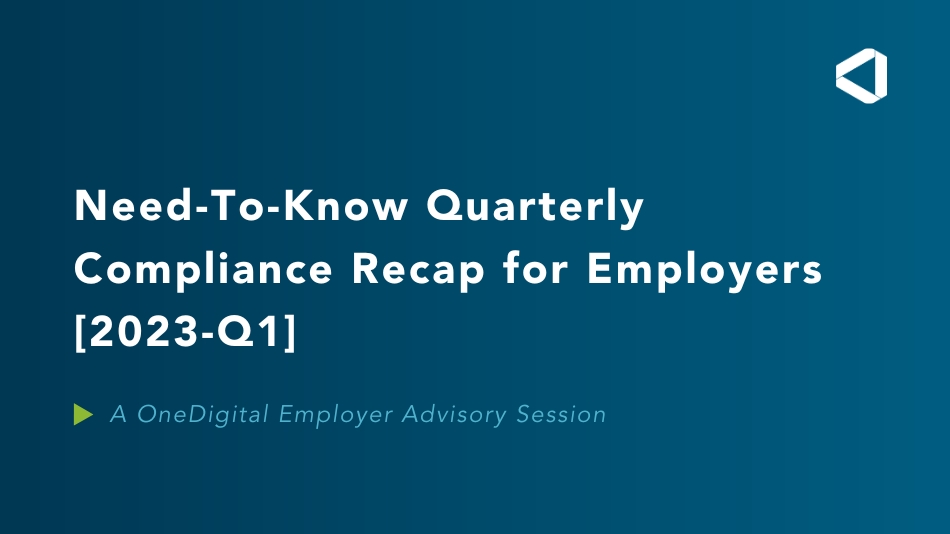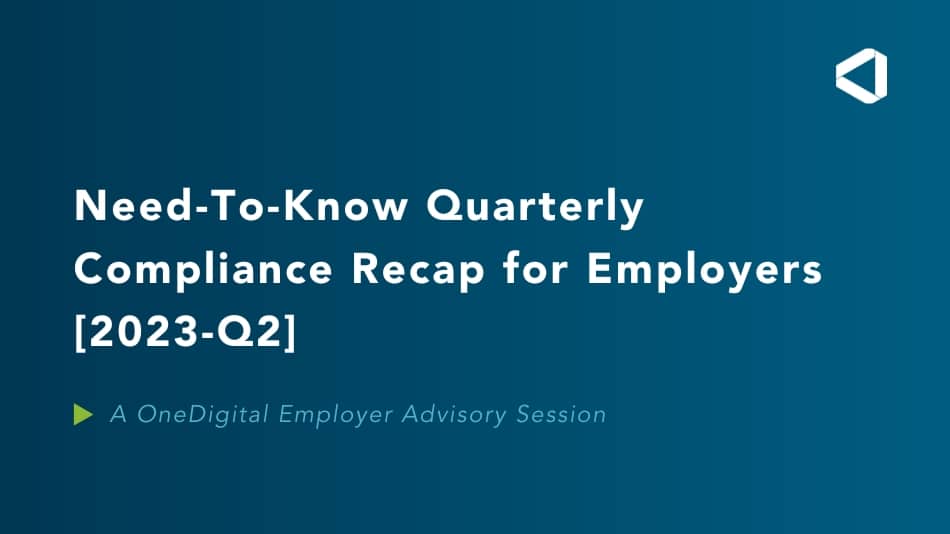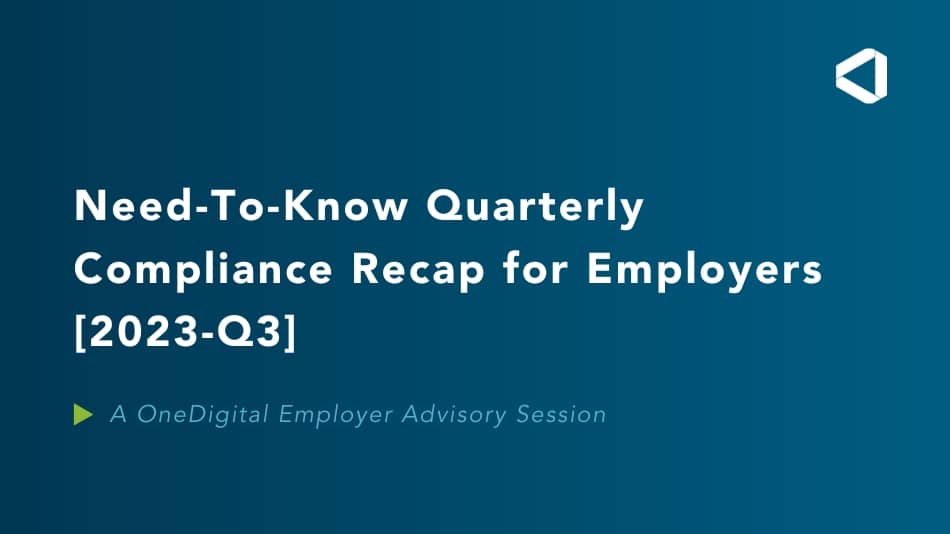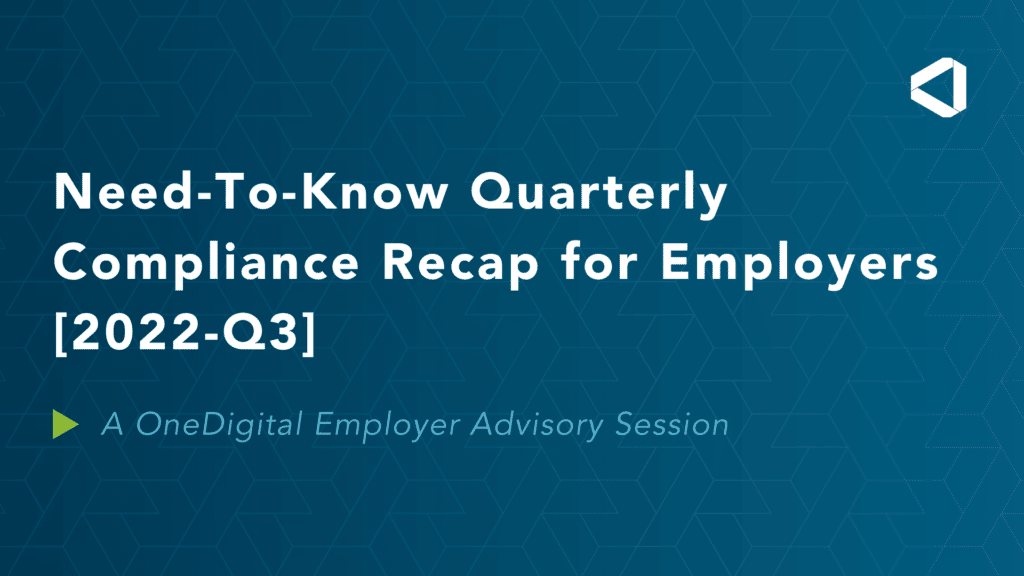Compliance Confidence
What We’re Watching: Employer Compliance Across Benefits, HR, and Retirement
What We’re Watching: Employer Compliance Across Benefits, HR, and Retirement
Staying updated on employer compliance can be a challenge. This monthly update is designed to highlight the latest developments impacting Employee Benefits, HR, and Retirement to keep your business running smoothly and minimize your compliance risk.
Upcoming Deadlines:
Most group health plan sponsors will be required to submit an annual gag clause compliance attestation by December 31, 2023. Click here to learn more.
November, 2023:
A Federal Government Shutdown Has Been Averted... For Now
Once again, Congress has managed to temporarily avert a government shutdown. However, the current reprieve will only last until January of 2024. Click here to learn how a shutdown would affect employers if and when it occurs.
IRS Releases 2024 Adjustments and Benefit Limits for ACA Affordability, HDHP Deductibles, FSA Contributions, and More
With 2024 approaching fast, the IRS has begun to release some of next year’s indexing adjustment and benefit limits for health and welfare plans. Click here for the latest updates.
Need-to-Know Quarterly Compliance Recap for Employers - Q3 2023
Join our team of compliance leaders for a 30-minute recap of the latest regulatory developments across benefits, retirement, HR, and more. You can watch the on-demand webinar here.
Pay Transparency and Pay Equity Laws by State: Understanding How the Pieces Fit
In the ever-evolving landscape of employment laws, pay transparency legislation has recently emerged as a significant topic of interest for employers and employees. Review the latest state-level developments here.
Gag Clauses & Group Health Plans: Employer Responsibilities and Requirements
2023 is the first year that the sponsors and/or issuers of group health plans will be required to submit a gag clause compliance attestation under the Consolidated Appropriations Act of 2021. In this on-demand webinar, the OneDigital compliance team reviews the necessary steps that plan sponsors need to complete prior to the December 31, 2023 deadline. You can watch the webinar here.
Determine How the Proposed Overtime Exempt Salary Increase Would Impact Your Business
The federal government is widely expected to increase minimum salary requirements for overtime-exempt employees in 2024. Our online calculator allows you to model the potential financial impact of this development on your organization.Click here to access the tool.
October, 2023:
Should Employers Encourage the Use of AI?
As generative AI programs such as ChatGPT become increasingly popular, many corporations have opted for an outright ban on their use in the workplace. In this podcast, two OneDigital compliance experts go head-to-head in a friendly debate over the wisdom of this approach. You can listen to the podcast here.
Departments Issue Request for Information on Coverage of Over-the-Counter Preventative Items and Services
On October 4, 2023, the federal government opened a period of public comment regarding health plan coverage of over-the-counter medicines. This period of public comment closed on December 4, 2023. Additional updates on this issue will be published as new information becomes available. Click here to learn more.
September, 2023:
Department of Labor Proposes Overtime Exempt Pay Increases
On September 8, 2023, the U.S. Department of Labor (DOL) published a proposed rule that would increase the minimum salary thresholds for overtime exempt employees. If approved, this rule would apply to all employers who are subject to the FLSA. Click here to learn more.
Reminder: Make Sure to Distribute Medical Loss Ratio (MLR) Rebates This Year
Due to a provision of the Affordable Care Act, many sponsors of fully insured health plans will soon receive a rebate check from their insurance carrier. Under ERISA, a portion of these rebates may be legally classified as "plan assets" that must be distributed to health plan participants. Click here to learn more.
Form I-9 and E-Verify: On-Demand Webinar
Did you know that there's a new Form I-9 and employee eligibility verification process? Don't worry; you can still watch our September 7 webinar to learn more about the latest requirements from the DHS and how to stay in compliance. Click here to see the on-demand recording.
August, 2023:
New Updates on 2024 IRS Plan Limits & Employer Shared Responsibility Recap
The Internal Revenue Service has released inflation-adjusted health plan limits for 2024. These include HSA contribution limits, minimum HDHP deductibles, and out-of-pocket maximums. The affordability baseline for employer-sponsored healthcare plan compliance with the Affordable Care Act (ACA) has also been updated, decreasing from 9.12% in 2023 to 8.39% in 2024. Failure to comply with the Employer Shared Responsibility provision of the ACA can be result in substantial fines for plan sponsors. Click here to learn more.
Hold Your Handbooks: There is a New NLRB Standard for Finding Employer Policies Unlawful
A recent legal case has resulted in the creation of a new National Labor Relations Board standard for when an employee can reasonably interpret an employer policy as being in violation of their Section 7 rights. The employer’s intent behind the rule is irrelevant. Click here to learn more.
A New Form I-9 is Here with Important Updates
Tne long-awaited new Form I-9 is now available for employers to use. There are significant changes to the form and process that employers should be aware of, including updates to pandemic-era remote verification requirements. For more detailed information, view this related blog post.
July, 2023:
Federal Departments Issue Proposed Mental Health Parity Rules Under MHPAEA
The Department of Labor, Health and Human Services, and the Treasury have proposed regulations are meant to better ensure that people seeking coverage for mental health and substance use disorder care can access treatment as easily as people seeking coverage for medical treatment. These proposed regulations are grounded in the Mental Health Parity and Addiction Equity Act (MHPAEA), an often-misunderstood piece of legislation that prohibits "group health plans and health insurance issuers that provide mental health or substance use disorder benefits from imposing less favorable benefit limitations on those benefits than on medical/surgical benefits.” Click here to learn more.
Form I-9: Employers Waiting for Change as Pandemic-Era Rule Ends
The Department of Homeland Security recently provided multiple updates regarding the planned expiration of a pandemic-era policy allowing for the remote verification of I-9 employment documents. One of these updates is that, as of August 1st, 2023, employers who use E-Verify and are in good standing may continue to use remote verification so long as they conduct verifications through a live video call interaction. Click here to learn more.
Should Employers be Taking the “Human” Out of Human Resources?
Though a growing number of businesses are rushing to integrate ChatGPT and similar large language models into their corporate processes, there are plenty of compliance-related issues that should give them pause. This piece covers several potential legal, ethical, and cybersecurity pitfalls that employers should be aware of as they attempt to leverage these tools for increased efficiency gains. Click here to learn more.
U.S. Supreme Court Shakes Up Individual Rights, but Will it Shake Up Employers?
The U.S. Supreme Court recently issued three rulings implicating affirmative action, religious accommodations, and first amendment rights. The fallout from these rulings is still being determined, and some of them will impact employers more than others. Click here to learn more.
June, 2023:
ACA Reporting Relief Coming Soon?
The House of Representatives passed H.R. 3801, more commonly known as the Employer Reporting Improvement Act. The bill has not yet been scheduled for a vote in the Senate, but optimism is high that it will pass and be signed into law by President Biden. Among the changes included in the act is a provision that will allow employers to send forms 6055 and 6056 electronically if an employee consents. The bill also establishes a six-year statute of limitations on employer shared responsibility payments. Finally, in certain circumstances employees can use an individual’s name and date of birth on reporting forms in place of a taxpayer ID number. All provisions would take effect in 2025.
IRS Extends HSA/HDHP Relief for COVID-19 Testing and Treatment
The IRS has extended a pandemic-era relief policy that allows High Deductible Health Plans (HDHPs) to cover costs associated with COVID-19 regardless of whether a plan member's deductible has been satisfied. The guidance states that an otherwise HSA-qualified HDHP would not lose the qualification if it provides coverage for COVID-19 testing and treatment before a minimum deductible is met. The extension will expire on plan years ending on or before December 31st, 2024. Click here to learn more.
President Biden Issues Executive Order on Contraception and Family Planning Services
One year after the Supreme Court's Dobbs decision, President Biden has issued a third executive order regarding access to contraception and family planning services. This order instructs federal departments to expand contraceptive access without cost-sharing and improve access to over-the-counter to contraceptives where possible. It also instructs the Department of Health and Human Services (HHS) to consider possibilities for expanding access to family planning services under Medicaid and Medicare. Click here to learn more.
Expanded Federal Protections for Pregnant and Nursing Employees Take Effect on June 27, 2023
As specified in the Pregnant Workers Fairness Act (PWFA), additional reasonable accommodation requirements for employers of pregnant and nursing workers took effect on Tuesday, June 27th. Among other things, this legislation entitles employees whose PWFA rights are violated to seek redress from illegal retaliation, back pay, front pay, reinstatement, compensatory and punitive damages, and the right to recover reasonable attorneys' fees and costs. Click here to learn more.
Preventative Health Coverage Requirements to Stay In Place During ACA Legal Challenge
Earlier this year, a federal judge in Texas issued a ruling stating that non-grandfathered group health plans and insurers no longer have to cover preventive services recommended by the United States Preventive Services Taskforce (USPSTF). The Braidwood ruling also stated that employers with religious objections that sponsor health plans no longer have to cover PrEP HIV medications. The Biden Administration is appealing this decision, which is currently under review by the Fifth Circuit Court of Appeals. No-cost coverage requirements for USPSTF-recommended services and PeEP medications will remainin in effect while the legal challenge is pending. Click here to learn more.
Departments Enforce Protections for Autism Treatments Under the MHPAEA
The Department of Labor, the Department of Health and Human Services, and the Department of the Treasury (the Departments) have issued guidance on the coverage of treatments for autism spectrum disorder (ASD) under the Mental Health Parity and Addiction Equality Act (MHPAEA). The Departments have stated that compliance with the MHPAEA requires health plan coverage of ASD treatments such as Applied Behavioral Analysis (ABA) therapy. Click here to learn more.
Visit OneDigital’s Compliance Confidence blog regularly for up-to-date information on what’s happening in Employee Benefits, HR, and Retirement compliance.
May, 2023:
Increased Penalty for EEO Poster Violations
Effective March 23, 2023, the Equal Employment Opportunity Commission has increased the penalty for failing to post required EEO notices in the workplace from $612 to $659. The new $659 penalty is assessed for each offense, so employers with multiple worksites and/or locations where notices to applicants and employees are customarily posted may be subject to additional penalties. Federal law requires employers to post details of employees’ statutory rights in a conspicuous, accessible location in the workplace. The EEOC’s Know Your Rights: Workplace Discrimination is Illegal Poster generally satisfies these requirements and is made available in multiple languages.
USCIS Gender Changes on Forms
On March 31, 2023, United States Citizenship and Immigration Services (USCIS) announced that it is no longer necessary to provide supporting documentation to change or update a prior gender selection on immigration forms, with limited exceptions. The website explains how to request a gender change on current documents.
Additionally, revised forms going forward will include an “X” marker for gender. This change is consistent with state self-certification policies for gender marker designations on driver’s licenses and identification cards.
PCORI Fee Deadline Just Around the Corner
The Affordable Care Act (ACA) imposes a fee on issuers of specified health insurance policies and plan sponsors of applicable self-insured health plans to help fund the Patient-Centered Outcomes Research Institute (PCORI). The fee is calculated based on the average number of lives covered under the policy or plan. PCORI fees are reported and paid annually using IRS Form 720 (Quarterly Federal Excise Tax Return). As a reminder, all self-insured health plans, including level-funded plans and HRAs, must submit the PCORI fee to the IRS by July 31, 2023.
Agency Guidance on ACA Preventive Health Services
The DOL, HHS, and IRS jointly issued FAQs following a ruling from a federal judge in Texas on the latest legal challenge, Braidwood Mgmt. Inc. v. Becerra (Braidwood), to the Affordable Care Act’s requirement to cover certain preventive services without cost-sharing. Although the decision in Braidwood prevents the agencies from implementing and enforcing coverage requirements for items and services recommended with an “A” or “B” rating by the USPSTF on or after March 23, 2010, the decision does not prevent plans and insurers from continuing to provide the full extent of such coverage.
The guidance also clarified that Braidwood does not affect items and services recommended with an “A” or “B” rating by the USPSTF before March 23, 2010, or recommendations by the ACIP and HRSA. Additionally, the guidance states that Braidwood only impacts federal law and not state-law requirements.
April, 2023:
End to COVID-19 National Emergency and Public Health Emergency
Legislation signed by President Biden on April 10, ends the COVID-19 National Emergency immediately; one month earlier than the anticipated. The end of the National Emergency ends many temporary rules and compliance responsibilities for plan sponsors, insurance carriers, and others that were put into place at the beginning of the COVID-19 pandemic. The Department of Labor (DOL) has informally announced that despite the statutory end of the Nation Emergency being 30 days earlier than expected, to avoid potential confusion and changes to administrative processes already in progress, the deadline of July 10, 2023 will remain the relevant date for the end of the COVID Outbreak Period. FAQs released on March 29, 2023 by the DOL, Treasury, and HHS provided the Outbreak Period generally continues until 60 days after the announced end of the COVID National Emergency or another date announced by the DOL, Treasury Department, and the IRS.
The legislation does not impact the Public Health Emergency, which is set to end on May 11, 2023. The end of the Public Health Emergency will end COVID relief legislation that required group health plans and insurers to cover COVID-19 diagnostic testing without cost-sharing, prior authorization, or other medical management requirements during the Public Health Emergency. Non-grandfathered plans were also required to cover COVID-19 vaccines without cost-sharing and on an expedited basis.
Challenges to the ACA Preventive Service Requirements
A federal judge in the U.S. District Court in the Northern District of Texas issued a ruling finding that non-grandfathered group health plans and insurers are no longer required to cover certain preventive services without cost sharing on a nationwide basis (Braidwood Mgmt. Inc. v. Becerra (Braidwood)). Following this ruling, the DOL issued FAQs clarifying that plans and issuers must continue to cover items and services with an “A” or “B” rating recommended or updated by USPSTF prior to March 23, 2010, without cost sharing.
While the Braidwood decision is in effect, items and services with an “A” or “B” rating on or after March 23, 2010, no longer have to be covered without cost sharing. Note, some state laws may require coverage similar to the provisions vacated by Braidwood. The federal government is currently appealing the Braidwood decision. As a reminder, even if the decision is upheld on appeal, plan sponsors can still choose to cover these preventative services.
Redesigned Green Cards and Employment Authorization Documents
Personnel who inspect work authorization documents should note that the U.S. Citizenship and Immigration Services (USCIS) have announced new designs to Permanent Resident Cards (Green Cards) and Employment Authorization Documents (EADs). The changes are meant to improve the security of the documents and are part of the routine update process. USCIS started issuing the new cards on January 30, 2023. Appropriate personnel should review samples of the redesigns to familiarize themselves with the new design of the documents.
Updated FCRA Summary of Consumer Rights
The Consumer Financial Protection Bureau (CFPB) released a new version of the Summary of Your Rights Under the Fair Credit Reporting Act on March 17, 2023. Employers must use the updated document by March 20, 2024. Employers must include the Summary with pre-adverse action notices in addition to providing it to applicants and employees to comply with the Fair Credit Reporting Act. The updates to the Summary are largely non-substantive and are technical corrections.






